Services
- Consensus Building/Conflict Resolution in Public Planning Processes
- Facility Site Selection Strategies
- Strategic Communication
- Community Relations in Hazardous/Radioactive Waste Projects
- Public Involvement and NEPA
- Training
- Consensus Building/Conflict Resolution in Public Planning Processes
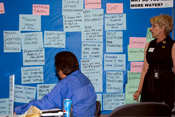 Consensus does not require that everyone be in complete agreement, but only that all be willing to accept—consent to—a decision. As a process, consensus addresses how individuals behave toward each other, as well as how they think about the relevant issues. Consensus frees the group from either/or thinking and emphasizes the possibilities of both/and thinking by focusing on needs and goals. Consensus requires explicit attention to ‘process’ as well as to ‘outcome’ and sets high standards for both. Not all projects will benefit from the consensus decision rule. Sometimes, what is most important is to make sure all views are thoroughly understood and alternatives fully exhausted so the decision maker can make an informed decision. The Rozelle Group frequently forms and facilitates advisory committees, working groups, or workshops to elicit interests rather than positions.
Consensus does not require that everyone be in complete agreement, but only that all be willing to accept—consent to—a decision. As a process, consensus addresses how individuals behave toward each other, as well as how they think about the relevant issues. Consensus frees the group from either/or thinking and emphasizes the possibilities of both/and thinking by focusing on needs and goals. Consensus requires explicit attention to ‘process’ as well as to ‘outcome’ and sets high standards for both. Not all projects will benefit from the consensus decision rule. Sometimes, what is most important is to make sure all views are thoroughly understood and alternatives fully exhausted so the decision maker can make an informed decision. The Rozelle Group frequently forms and facilitates advisory committees, working groups, or workshops to elicit interests rather than positions.- Examples of Consensus Building projects
- Facility Site Selection Strategies
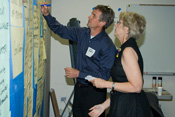 The primary objective in a site selection process is to find a site for facilities (often unwanted by many stakeholders) that will be technically feasible, environmentally compatible, economically viable, and publicly acceptable. Rather than beginning with specific sites, The Rozelle Group counsels clients to work with stakeholders first to identify and prioritize the criteria or attributes of a good site, then match potential sites to these criteria. Often, the final and best site will not be the initial one identified by the technical team, but it is the site that gets built.
The primary objective in a site selection process is to find a site for facilities (often unwanted by many stakeholders) that will be technically feasible, environmentally compatible, economically viable, and publicly acceptable. Rather than beginning with specific sites, The Rozelle Group counsels clients to work with stakeholders first to identify and prioritize the criteria or attributes of a good site, then match potential sites to these criteria. Often, the final and best site will not be the initial one identified by the technical team, but it is the site that gets built.- Examples of siting projects
- Strategic Communication
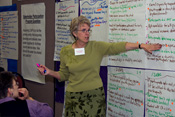 Effective two-way communication is essential to projects with lasting outcomes. The Rozelle Group integrates the public’s involvement into structured decision or planning processes. First, what is the specific problem being addressed and do all decision makers define the problem in the same way? What information does the decision maker need to move the project forward? What does the stakeholder need to know to participate in meaningful ways? Dr. Rozelle works carefully with her clients to create a pathway for the exchange of information, respectful listening among all participants, and anticipation and management of public outrage.
Effective two-way communication is essential to projects with lasting outcomes. The Rozelle Group integrates the public’s involvement into structured decision or planning processes. First, what is the specific problem being addressed and do all decision makers define the problem in the same way? What information does the decision maker need to move the project forward? What does the stakeholder need to know to participate in meaningful ways? Dr. Rozelle works carefully with her clients to create a pathway for the exchange of information, respectful listening among all participants, and anticipation and management of public outrage.- Examples of Strategic Communication projects
- Community Relations in Hazardous/Radioactive Waste Projects
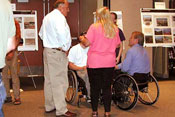 The Rozelle Group counsels the potentially responsible party in the design and implementation of community relations programs that meet CERCLA, aka: the “Superfund”, RCRA, and state requirements. Dr, Rozelle has worked on these type projects in Arizona, California, Utah, Idaho, North Carolina, Florida, Illinois, South Carolina, Arkansas, Pennsylvania, Michigan, Montana, New Mexico, Washington, and Texas. A proactive approach by the owner and a good working relationship with the regulatory agencies have resulted in increased credibility, timely and accurate information, and effectively closed sites.
The Rozelle Group counsels the potentially responsible party in the design and implementation of community relations programs that meet CERCLA, aka: the “Superfund”, RCRA, and state requirements. Dr, Rozelle has worked on these type projects in Arizona, California, Utah, Idaho, North Carolina, Florida, Illinois, South Carolina, Arkansas, Pennsylvania, Michigan, Montana, New Mexico, Washington, and Texas. A proactive approach by the owner and a good working relationship with the regulatory agencies have resulted in increased credibility, timely and accurate information, and effectively closed sites.- Examples of Community Relations projects
- Public Involvement and NEPA
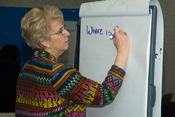 At The Rozelle Group we go beyond the traditional NEPA public involvement activities. We have successfully designed and facilitated workshops that allow stakeholders to play a part in the formulation of alternatives and have meaningful input to the impact analysis. At other times, we have conducted a full collaboration effort with all key stakeholders to scope the project, formulate and evaluate alternatives prior to beginning the NEPA process.
At The Rozelle Group we go beyond the traditional NEPA public involvement activities. We have successfully designed and facilitated workshops that allow stakeholders to play a part in the formulation of alternatives and have meaningful input to the impact analysis. At other times, we have conducted a full collaboration effort with all key stakeholders to scope the project, formulate and evaluate alternatives prior to beginning the NEPA process.- Examples of Public Involvement projects
- Training
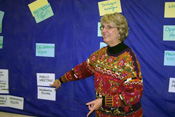 Training is an ongoing part of The Rozelle Group’s mission. Prior to every major contact with the public our standard practice is to prepare the project team to speak with the public, answer tough questions, and interact effectively with the angry or emotional individual. Dr. Rozelle is a primary developer of the International Association for Public Participation 40-hour Certificate Training Program and has personally trained at least 2000 individuals in four countries. She frequently will conduct one-day sessions in public participation techniques or effective communication tailored to the needs of the client organization. Dr. Rozelle also designs and facilitates retreats and visioning sessions for Boards of Directors of non-profit organizations.
Training is an ongoing part of The Rozelle Group’s mission. Prior to every major contact with the public our standard practice is to prepare the project team to speak with the public, answer tough questions, and interact effectively with the angry or emotional individual. Dr. Rozelle is a primary developer of the International Association for Public Participation 40-hour Certificate Training Program and has personally trained at least 2000 individuals in four countries. She frequently will conduct one-day sessions in public participation techniques or effective communication tailored to the needs of the client organization. Dr. Rozelle also designs and facilitates retreats and visioning sessions for Boards of Directors of non-profit organizations.- Examples of Training projects


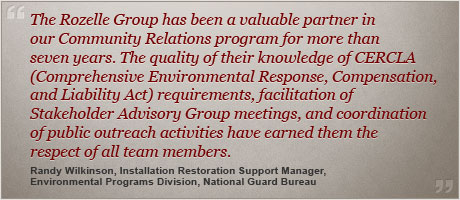
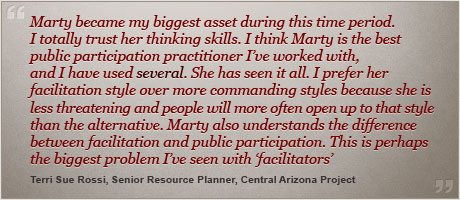
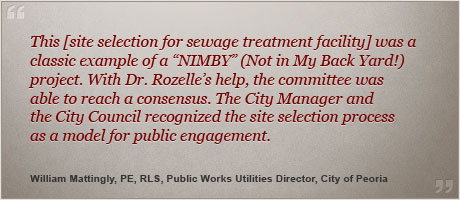
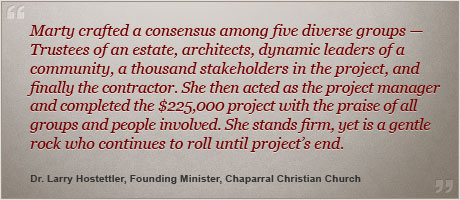
 Consensus does not require that everyone be in complete agreement, but only that all be willing to accept—consent to—a decision. As a process, consensus addresses how individuals behave toward each other, as well as how they think about the relevant issues. Consensus frees the group from either/or thinking and emphasizes the possibilities of both/and thinking by focusing on needs and goals. Consensus requires explicit attention to ‘process’ as well as to ‘outcome’ and sets high standards for both. Not all projects will benefit from the consensus decision rule. Sometimes, what is most important is to make sure all views are thoroughly understood and alternatives fully exhausted so the decision maker can make an informed decision. The Rozelle Group frequently forms and facilitates advisory committees, working groups, or workshops to elicit interests rather than positions.
Consensus does not require that everyone be in complete agreement, but only that all be willing to accept—consent to—a decision. As a process, consensus addresses how individuals behave toward each other, as well as how they think about the relevant issues. Consensus frees the group from either/or thinking and emphasizes the possibilities of both/and thinking by focusing on needs and goals. Consensus requires explicit attention to ‘process’ as well as to ‘outcome’ and sets high standards for both. Not all projects will benefit from the consensus decision rule. Sometimes, what is most important is to make sure all views are thoroughly understood and alternatives fully exhausted so the decision maker can make an informed decision. The Rozelle Group frequently forms and facilitates advisory committees, working groups, or workshops to elicit interests rather than positions. The primary objective in a site selection process is to find a site for facilities (often unwanted by many stakeholders) that will be technically feasible, environmentally compatible, economically viable, and publicly acceptable. Rather than beginning with specific sites, The Rozelle Group counsels clients to work with stakeholders first to identify and prioritize the criteria or attributes of a good site, then match potential sites to these criteria. Often, the final and best site will not be the initial one identified by the technical team, but it is the site that gets built.
The primary objective in a site selection process is to find a site for facilities (often unwanted by many stakeholders) that will be technically feasible, environmentally compatible, economically viable, and publicly acceptable. Rather than beginning with specific sites, The Rozelle Group counsels clients to work with stakeholders first to identify and prioritize the criteria or attributes of a good site, then match potential sites to these criteria. Often, the final and best site will not be the initial one identified by the technical team, but it is the site that gets built. Effective two-way communication is essential to projects with lasting outcomes. The Rozelle Group integrates the public’s involvement into structured decision or planning processes. First, what is the specific problem being addressed and do all decision makers define the problem in the same way? What information does the decision maker need to move the project forward? What does the stakeholder need to know to participate in meaningful ways? Dr. Rozelle works carefully with her clients to create a pathway for the exchange of information, respectful listening among all participants, and anticipation and management of public outrage.
Effective two-way communication is essential to projects with lasting outcomes. The Rozelle Group integrates the public’s involvement into structured decision or planning processes. First, what is the specific problem being addressed and do all decision makers define the problem in the same way? What information does the decision maker need to move the project forward? What does the stakeholder need to know to participate in meaningful ways? Dr. Rozelle works carefully with her clients to create a pathway for the exchange of information, respectful listening among all participants, and anticipation and management of public outrage. The Rozelle Group counsels the potentially responsible party in the design and implementation of community relations programs that meet CERCLA, aka: the “Superfund”, RCRA, and state requirements. Dr, Rozelle has worked on these type projects in Arizona, California, Utah, Idaho, North Carolina, Florida, Illinois, South Carolina, Arkansas, Pennsylvania, Michigan, Montana, New Mexico, Washington, and Texas. A proactive approach by the owner and a good working relationship with the regulatory agencies have resulted in increased credibility, timely and accurate information, and effectively closed sites.
The Rozelle Group counsels the potentially responsible party in the design and implementation of community relations programs that meet CERCLA, aka: the “Superfund”, RCRA, and state requirements. Dr, Rozelle has worked on these type projects in Arizona, California, Utah, Idaho, North Carolina, Florida, Illinois, South Carolina, Arkansas, Pennsylvania, Michigan, Montana, New Mexico, Washington, and Texas. A proactive approach by the owner and a good working relationship with the regulatory agencies have resulted in increased credibility, timely and accurate information, and effectively closed sites. At The Rozelle Group we go beyond the traditional NEPA public involvement activities. We have successfully designed and facilitated workshops that allow stakeholders to play a part in the formulation of alternatives and have meaningful input to the impact analysis. At other times, we have conducted a full collaboration effort with all key stakeholders to scope the project, formulate and evaluate alternatives prior to beginning the NEPA process.
At The Rozelle Group we go beyond the traditional NEPA public involvement activities. We have successfully designed and facilitated workshops that allow stakeholders to play a part in the formulation of alternatives and have meaningful input to the impact analysis. At other times, we have conducted a full collaboration effort with all key stakeholders to scope the project, formulate and evaluate alternatives prior to beginning the NEPA process. Training is an ongoing part of The Rozelle Group’s mission. Prior to every major contact with the public our standard practice is to prepare the project team to speak with the public, answer tough questions, and interact effectively with the angry or emotional individual. Dr. Rozelle is a primary developer of the International Association for Public Participation 40-hour Certificate Training Program and has personally trained at least 2000 individuals in four countries. She frequently will conduct one-day sessions in public participation techniques or effective communication tailored to the needs of the client organization. Dr. Rozelle also designs and facilitates retreats and visioning sessions for Boards of Directors of non-profit organizations.
Training is an ongoing part of The Rozelle Group’s mission. Prior to every major contact with the public our standard practice is to prepare the project team to speak with the public, answer tough questions, and interact effectively with the angry or emotional individual. Dr. Rozelle is a primary developer of the International Association for Public Participation 40-hour Certificate Training Program and has personally trained at least 2000 individuals in four countries. She frequently will conduct one-day sessions in public participation techniques or effective communication tailored to the needs of the client organization. Dr. Rozelle also designs and facilitates retreats and visioning sessions for Boards of Directors of non-profit organizations.